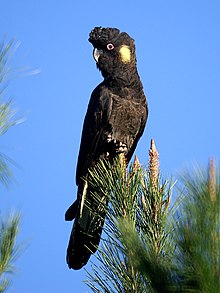Yellow-tailed black cockatoos are a little flighty around humans, which can make it difficult for scientists to capture them. But if you cruise up to one in a car, it won't be particularly bothered.
 "They don't associate it with threat, so we can sneak up in the car and launch the net onto them," wildlife ecologist John Martin said.
"They don't associate it with threat, so we can sneak up in the car and launch the net onto them," wildlife ecologist John Martin said.
Dr Martin, who works with the Botanic Gardens and Centennial Parklands, is part of the first study to track yellow-tailed black-cockatoos in the wild, which in Sydney includes the eastern suburbs and industrial areas such as Port Botany.
Dr Martin and Jessica Rooke, an honours student at the University of NSW, have fitted 11 of the birds with solar-powered GPS tracking devices. With the help of members of the public, who are encouraged to report sightings, they will collect new data on the species.
There has been little research published on yellow-tailed black cockatoos, Ms Rooke said. "A lot of people are under the false impression that the population is doing quite well," she said. "But some of the recent research has shown they've significantly declined along the east coast, so now more than ever we need to find out as much as we can about them."
The cockatoos often forage in Centennial Park but tend to roost elsewhere. Ms Rooke said people who encountered them could play a vital role in the project by reporting their observations through an online survey.
No comments:
Post a Comment